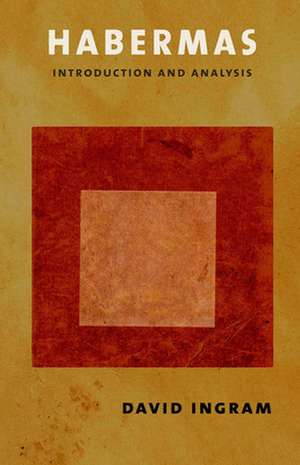Habermas – Introduction and Analysis
Autor David Ingramen Limba Engleză Hardback – 14 sep 2010
Ingram's book addresses the entire range of Habermas's social theory, including his most recent and widely discussed contributions to religion, freedom and determinism, global democracy, and the consolidation of the European Union. Recognizing Habermas's position as a highly public intellectual, Ingram discusses how Habermas applies his own theory to pressing problems such as abortion, terrorism, genetic engineering, immigration, multiculturalism, separation of religion and state, technology and mass media, feminism, and human rights. He also presents a detailed critical analysis of Habermas's key claims and arguments. Separate appendixes introduce and clarify such important concepts as causal, teleological, and narrative paradigms of explanation in action theory; contextualism versus rationalism in social scientific methods of interpretation; systems theory and functionalist explanation in social science; and decision and collective choice theory.
| Toate formatele și edițiile | Preț | Express |
|---|---|---|
| Paperback (1) | 287.79 lei 6-8 săpt. | |
| MB – Cornell University Press – 14 sep 2010 | 287.79 lei 6-8 săpt. | |
| Hardback (1) | 724.47 lei 6-8 săpt. | |
| MB – Cornell University Press – 14 sep 2010 | 724.47 lei 6-8 săpt. |
Preț: 724.47 lei
Preț vechi: 992.42 lei
-27% Nou
Puncte Express: 1087
Preț estimativ în valută:
138.63€ • 145.40$ • 115.40£
138.63€ • 145.40$ • 115.40£
Carte tipărită la comandă
Livrare economică 01-15 aprilie
Preluare comenzi: 021 569.72.76
Specificații
ISBN-13: 9780801448799
ISBN-10: 0801448794
Pagini: 384
Ilustrații: black & white tables
Dimensiuni: 164 x 240 x 26 mm
Greutate: 0.66 kg
Editura: MB – Cornell University Press
ISBN-10: 0801448794
Pagini: 384
Ilustrații: black & white tables
Dimensiuni: 164 x 240 x 26 mm
Greutate: 0.66 kg
Editura: MB – Cornell University Press
Descriere
Ingram provides an introduction to Habermas's complex thought as it has evolved from 1953 to the present, spanning philosophy, religion, political science, social science, and law.
